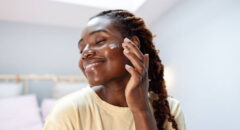body {
background: #FFF;
}
(BlackDoctor.org) — Relax those fidgety legs and put an end
to the restlessness. According to research or other evidence, the following
self-care steps may help you kick the discomfort of RLS:
What You Need To Know:
- Balance your blood sugar
Replace sugar, refined flour,
and alcohol in your diet with small, frequent meals containing whole grains,
fish, nuts, seeds, and fresh fruits and vegetables - Cut the caffeine
Help reduce the severity of RLS by
steering clear of coffee, tea, and other sources of caffeine - Keep an eye on iron
See a healthcare practitioner to
find out if you have an iron deficiency that could be contributing to your
restless legs syndrome
These recommendations are not comprehensive and are not intended to replace
the advice of your doctor or pharmacist. Continue reading the full restless legs
syndrome article for more in-depth, fully-referenced information on medicines,
vitamins, herbs, and dietary and lifestyle changes that may be helpful.
Dietary changes that may be
helpful
Preliminary studies of large groups of people with
reactive hypoglycemia have reported that 8% have restless legs. These symptoms
have been reported to improve following dietary modifications designed to
regulate blood-sugar levels;2 changes included a sugar-free, high-protein diet
along with frequent snacking and at least one night-time feeding.3 For patients
with reactive hypoglycemia, some doctors recommend elimination of sugar, refined
flour, caffeine, and alcohol from the diet; eating small, frequent meals; and
eating whole grains, nuts and seeds, fresh fruits and vegetables, and fish. One
study found caffeine ingestion to be associated with increased symptom severity
in people with RLS.4
Lifestyle changes that may be
helpful
Anecdotal evidence suggests that RLS symptoms my
decrease with a cessation of smoking.5 Although additional research is needed to
confirm such reports, a trial of smoking cessation seems prudent for people who
suffer from restless legs.
Other therapies
Symptoms may
also respond to correction of an underlying medical condition, such as
iron-deficiency anemia, kidney disease, diabetic neuropathy, amyloidosis,
chronic venous insufficiency, or malignancy.
Vitamins that may be
helpful
Mild iron deficiency is common, even in people who
are not anemic. When iron deficiency is the cause of RLS, supplementation with
iron has been reported to reduce the severity of the symptoms. In one trial, 74
mg of iron taken three times a day for two months, reduced symptoms in people
with RLS.6 In people who are not deficient in iron, iron supplementation has
been reported to not help reduce symptoms of RLS.7 Most people are not iron
deficient, and taking too much can lead to adverse effects. Therefore, iron
supplements should only be taken by people who have a diagnosed deficiency.
In a preliminary trial, people with period limb movements during sleep (PLMS)
or RLS who suffered from insomnia had a significant improvement in sleep
efficiency after supplementing with magnesium (about 300 mg each evening for
four to six weeks).8
In some people with RLS, the condition may be genetic. People with familial
RLS appear to have inherited an unusually high requirement for folic acid.
Although not all people with RLS suffer from uncomfortable sensations,
folate-deficient people with this condition always do.9 In one report, 45 people
were identified to be from families with folic acid-responsive RLS. The amount
of folic acid required to relieve their symptoms was extremely large, ranging
from 5,000 to 30,000 mcg per day.10 Such amounts should only be taken under the
supervision of a healthcare professional.
In a group of nine people with RLS, 300 IU of vitamin E per day produced
complete relief in seven.11 Doctors who give vitamin E to people with RLS
generally recommend at least 400 IU of vitamin E per day, and the full benefits
may not become apparent for three months.12
Are there any side effects or
interactions?
Refer to the individual supplement for
information about any side effects or interactions.
1. Kanter AH. The effect of sclerotherapy on restless legs syndrome. Dermatol
Surg 1995;21:328–32.
2. Roberts HJ. Spontaneous leg cramps and “restless legs” due to diabetogenic
hyperinsulinism: observations on 131 patients. J Am Geriatr Soc
1965;13:602–8.
3. Roberts HJ. Spontaneous leg cramps and “restless legs” due to diabetogenic
(functional) hyperinsulinism. A basis for rational therapy. JFMA
1973;60:29–31.
4. Lutz EG. Restless legs, anxiety and caffeinism. J Clin Psychiatry
1978;39:693–8.
5. Mountifield JA. Restless leg syndrome relieved by cessation of cigarette
smoking. Can Med Assoc J 1985;133:426.
6. O’Keeffe ST, Gavin K, Lavan JN. Iron status and restless legs syndrome in
the elderly. Age Ageing 1994;23:200–3.
7. Davis BJ, Rajput A, Rajput ML, et al. A randomized, double-blind
placebo-controlled trial of iron in restless legs syndrome. Eur Neurol
2000;43:70–5.
8. Hornyak M, Voderholzer U, Hohagen F, et al. Magnesium therapy for periodic
leg movements-related insomnia and restless legs syndrome: an open pilot study.
Sleep 1998;21:501–5.
9. Botez MI. Neuropsychological correlates of folic acid deficiency: facts
and hypotheses. in: Botez MI, Reynolds EH, eds. Folic Acid in Neurology,
Psychiatry and Internal Medicine. New York: Raven Press, 1979.
10. Botez MI. Folate deficiency and neurological disorders in adults. Med
Hypotheses 1976;2:135–40.
11. Ayres S Jr, Mihan R. “Restless legs” syndrome: Response to vitamin E. J
Appl Nutr 1973;25:8–15.
12. Ayres S, Mihan R. Leg cramps and “restless leg” syndrome responsive to
vitamin E. Calif Med 1969;111:87–91.








